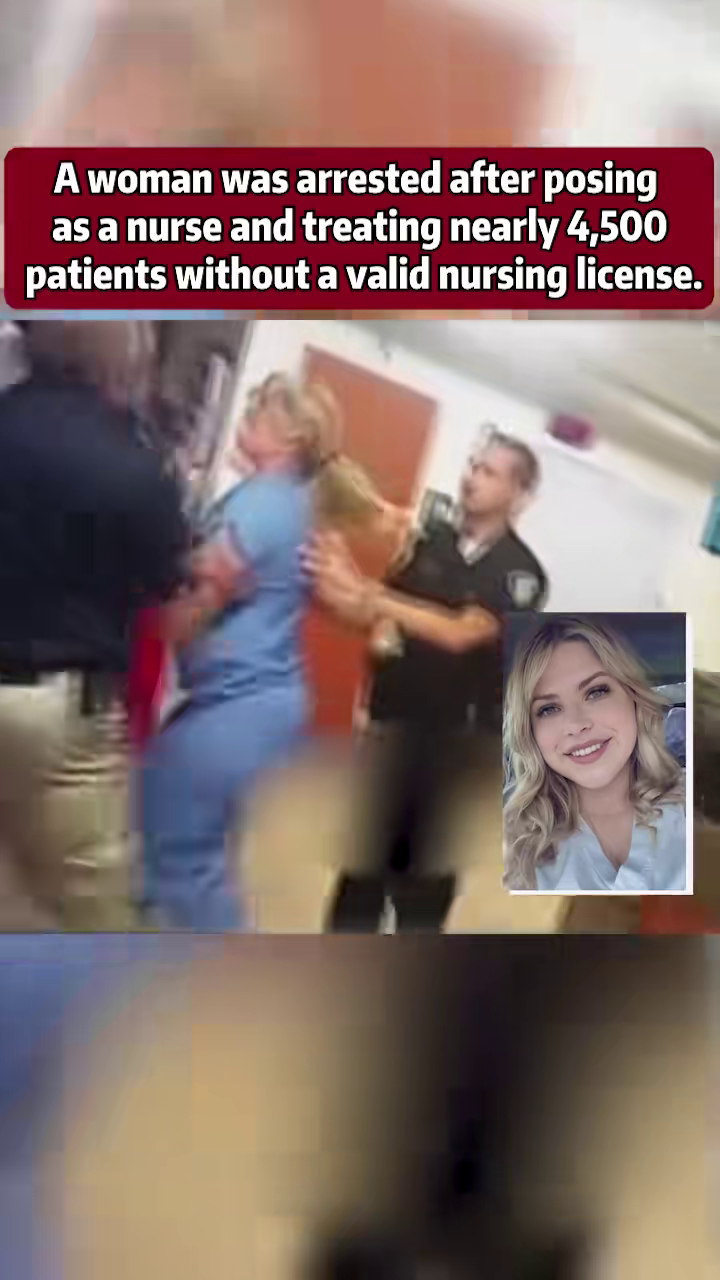The American healthcare system is built on a foundation of trust and professional expertise. Patients entrust their lives to licensed, certified professionals, assuming a minimum standard of care and competence. That foundation was violently shaken by the case of Autumn Marie Bardisa, a 29-year-old woman whose alleged deception has become a national headline. Bardisa was arrested on charges of posing as a registered nurse, treating an astounding 4,500 patients without possessing a valid nursing license. This shocking breach of trust, which involved multiple felony charges, has sparked intense scrutiny into hospital hiring practices and the potential dangers of unlicensed medical personnel.
The Allegations: A Massive Breach of Trust
According to court records and reports from Flagler County Police, Autumn Marie Bardisa was not a licensed registered nurse, yet she allegedly held a position as an “advanced nurse technician” at AdventHealth Palm Coast. The core of the accusation is that she misrepresented her credentials, going so far as to claim she was an “Education First Registered Nurse.” This deception allowed her to operate within a sensitive medical environment, interacting directly with patients and potentially compromising their care. The scale of the alleged operation is staggering: police claim she treated nearly 4,500 individuals while operating without the required professional license.
The Scope of the Criminal Charges
The severity of the charges reflects the gravity of the alleged crimes. Bardisa has been charged with 14 felony counts of practicing medicine without a license, a charge that alone carries substantial jail time and significant fines. Practicing any regulated medical profession without the necessary certification is a direct threat to public health and is universally considered a serious felony.
Furthermore, she faces charges related to fraudulently using someone else’s identification. This suggests that to secure or maintain her position, Bardisa may have used or manipulated the identity of a legitimately credentialed person, complicating the case with allegations of identity theft and digital fraud.
Allegations Involving Prescription Drugs
The police report introduced another layer of shocking detail: allegations that Bardisa was involved in improper use and distribution of pharmaceuticals. Specifically, she was accused of selling the drug Ozempic to a hospital employee. Ozempic, a medication primarily used to treat type 2 diabetes and increasingly prescribed off-label for weight management, requires a valid prescription and professional oversight for proper dispensing. An unlicensed person allegedly selling or distributing such a potent drug represents a grave danger to the recipient’s health and constitutes a serious pharmaceutical violation.
In a separate but equally concerning allegation, she was accused of giving a birth control injection to another person. Administering injections, especially hormonal ones, is a delicate medical procedure that requires training, sterile technique, and a licensed provider’s order. This action, if true, highlights the direct and dangerous medical interventions she was allegedly undertaking without qualification.
The Unraveling: From Suspicion to Arrest
For a time, the alleged ruse worked. Bardisa was employed within a major healthcare system, presumably interacting daily with licensed doctors and nurses. The system, designed to protect patients, failed to flag her for an extended period.
The unmasking of the alleged fake nurse began, as it often does, with suspicion from her supervisors. The video and reports indicate that her supervisors at AdventHealth Palm Coast began to have doubts about her qualifications and activities. While the exact details of what sparked the suspicion are not always made public, inconsistencies in performance, a lack of specific knowledge expected of a registered nurse, or irregularities in her paperwork can all trigger an internal investigation.
Once the internal review commenced, the necessary legal steps were taken. The investigation, spearheaded by Flagler County Police, concluded with her arrest. The public footage of a woman being arrested in what appears to be a nurse’s uniform serves as a stark visual reminder of the alleged duplicity.
Following her arrest, Autumn Marie Bardisa was taken to the Sheriff Perry Hall Inmate Detention Facility. She was subsequently held on a substantial $70,000 bond, a figure reflecting the seriousness of the multiple felony charges against her, particularly the sheer number of patients she allegedly impacted. Her initial arraignment date was set for September 2nd.
The Deeper Consequences: Why Unlicensed Practice is a Critical Threat
The case of Autumn Marie Bardisa is more than a cautionary tale of a criminal enterprise; it is a profound indictment of the risks inherent in unlicensed medical practice. The sheer volume of patients—4,500—means that an untold number of people in the community may have received care from an individual lacking the fundamental education, certification, and training required by law.
Dangers to Patient Safety
The primary concern is patient safety. Unlicensed practice poses immediate and long-term risks, including:
- Misdiagnosis: A lack of proper medical training can lead to a failure to correctly identify and treat serious health conditions.
- Improper Procedures: Unqualified individuals are prone to making errors during critical procedures, like administering injections or monitoring vital signs. In this case, the allegation of an improper birth control shot is a direct example of this.
- Medication Errors: Handling, prescribing, or dispensing medication without a license increases the risk of dangerous drug interactions, incorrect dosages, and improper usage, as highlighted by the Ozempic allegation.
- Lack of Accountability: Unlicensed individuals are not subject to the professional disciplinary boards that regulate licensed nurses and doctors, offering no legitimate recourse for professional misconduct or negligence.
Impact on the Healthcare System
The secondary effects of this type of crime are equally devastating to the healthcare system:
- Erosion of Public Trust: High-profile cases of fake medical professionals breed public skepticism, making it harder for legitimate healthcare providers to gain the trust necessary for effective treatment.
- Increased Scrutiny and Cost: Hospitals and clinics are forced to tighten screening protocols, which can be costly and slow down the hiring process. This is particularly problematic in a time when the nursing shortage is a pressing national issue.
- Legal and Financial Liability: The employing hospital, AdventHealth Palm Coast, faces potential civil liability from the thousands of patients allegedly treated by Bardisa. The ensuing lawsuits could be extensive, costing the institution millions and further diverting resources from patient care.
Lessons for Hospitals and Patients
This case illuminates critical vulnerabilities within even large, reputable healthcare systems. The fact that a single individual could allegedly maintain a deceptive role for an extended period, treating thousands, demands a re-evaluation of institutional safeguards.
For Healthcare Facilities: Strengthening the Gatekeepers
Hospitals must commit to redundant verification systems for all clinical staff. Relying on a single Human Resources check is insufficient. Best practices should now include:
- Direct Source Verification: Licensing checks must be conducted directly with the state’s Board of Nursing (or equivalent regulatory body), not just by accepting copies of a license or a third-party background check.
- Primary Source Identification: Verifying the authenticity of the individual’s identity documents against government records to prevent the fraudulent use of another person’s ID.
- Supervisory Audits: Implementing mandatory, periodic audits by clinical managers to ensure staff duties align perfectly with their documented scope of practice and licensing credentials.
For Patients: The Right to Verify
Patients should also feel empowered to be their own advocates. While it may seem unusual, patients have the right to confirm the credentials of their caregivers. Most state boards of nursing offer an online, public search tool to look up a nurse’s license status by name. While most healthcare professionals are legitimate, this simple, private step can offer an invaluable layer of personal protection and peace of mind.
The Road Ahead
Autumn Marie Bardisa faces a long and complex legal battle. The 14 felony counts against her are serious, and the sheer number of alleged victims—4,500 patients—will weigh heavily on the prosecution’s case and the sentencing phase.
The legal proceedings will aim to establish the full extent of her actions, determine whether any of the patients suffered harm, and ultimately decide the appropriate penalty for this immense breach of public trust. The community, the hospital, and the public will be closely watching, hoping that this deeply troubling case leads to more robust protections for patients and an uncompromising standard of integrity in the vital field of medicine.

